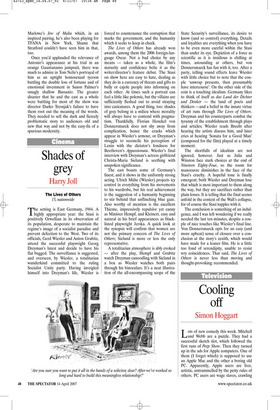Shades of grey
Harry Joll
The Lives of Others 15, nationwide
The setting is East Germany, 1984. A highly appropriate year: the Stasi is positively Orwellian in its observation of its population, desperate to maintain the regime’s image of a socialist paradise and prevent defection to the West. Two of its officials, Gerd Wiesler and Anton Grubitz, attend the successful playwright Georg Dreyman’s latest and decide to have his flat bugged. The surveillance is suggested, and overseen, by Wiesler, a totalitarian wunderkind committed to the ruling Socialist Unity party. Having inveigled himself into Dreyman’s life, Wiesler is forced to countenance the corruption that marks the government, and the humanity which it seeks to keep in check.
The Lives of Others has already won awards, among them the 2006 foreign-language Oscar. Not a bad choice by any means — taken as a whole, the film’s maturity and confidence belie it as the writer/director’s feature debut. The Stasi on show here are easy to hate, dealing as they do in a currency of threats and gifts to bully or cajole people into informing on each other. At times such a portrait can feel a little like polemic, but the villains are sufficiently fleshed out to avoid straying into caricatures. A good thing, too: shades of grey belong in a milieu where morality will always have to contend with pragmatism. Thankfully, Florian Henckel von Donnersmarck does not shy away from complication, hence the cracks which appear in Wiesler’s armour, or Dreyman’s struggle to reconcile his perception of Lenin with the dictator’s fondness for Beethoven’s Appassionata. Wiesler’s final interview with Dreyman’s actress girlfriend Christa-Maria Sieland is seething with unspoken significance.
The cast boasts some of Germany’s finest, and it shows in the uniformly strong acting. Ulrich Mühe (Wiesler) projects icy control in everything from his movements to his wardrobe, but his real achievement is the suggestion of a humanity beginning to stir behind that unflinching blue gaze. Also worthy of mention is the excellent Thieme, impressively repulsive yet canny as Minister Hempf, and Kleinert, easy and natural in his brief appearances as blacklisted playwright Jerska. A quick look at the synopsis will confirm that women are not the primary concern of The Lives of Others; Sieland is more or less the only representative.
A totalitarian atmosphere is ably evoked — after the play, Hempf and Grubitz watch Dreyman canoodling with Sieland in a box as Wiesler watches both pairs through his binoculars. It’s a neat illustration of the all-encompassing scope of the State Security’s surveillance, its desire to know (and so control) everything. Details and loyalties are everything when you have to be even more careful within the Stasi than under its eye. Depiction of a force as scientific as it is insidious is chilling at times, astounding at others, but von Donnersmarck has fun with it, too. After a party, telling sound effects leave Wiesler with little choice but to note that the couple ‘unwrap presents, then presumably have intercourse’. On the other side of the coin is a touching idealism. Germany likes to think of itself as das Land der Dichter und Denker — the land of poets and thinkers —and a belief in the innate virtue of art runs through The Lives of Others. Dreyman and his counterparts combat the tyranny of the establishment through plays and articles; Wiesler reads Brecht after hearing the artists discuss him, and later cries at hearing ‘Sonata for a Good Man’ (composed for the film) played at a timely moment.
The shortfalls of idealism are not ignored, however. Just as Julia and Winston face stark choices at the end of Nineteen Eighty-Four, so the room for manoeuvre diminishes in the face of the Stasi’s cruelty. A hopeful tone is finally emergent; both Wiesler and Dreyman lose that which is most important to them along the way, but they are sacrifices rather than plain losses. It is telling that the final scenes unfold in the context of the Wall’s collapse, for of course the Stasi topples with it.
The conclusion is something of an indulgence, and I was left wondering if we really needed the last ten minutes, despite a couple of nice touches like Wiesler’s final line. Von Donnersmarck opts for an easy (and more upbeat) sense of closure over a conclusion at the story’s zenith, which would have made for a leaner film. He is a little too fond of serendipity, unable to resist wry coincidences. That said, The Lives of Others is never less than moving and thought-provoking: recommended.


































































 Previous page
Previous page